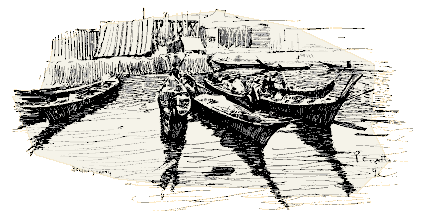|
||||||||||||||||||||||||||||||||||||||||
|
 Illustration for "Rats of Sacramento," Overland Monthly, 1900. Whether from a sense of fairness in the matter of a division of time and opportunities with man and other animals, or in an expedient conformity to the law which impels the most lawless criminal to regard the rights of others in the presence of an alternate peril, they were less assertive during the day than they were at night; but, day or night, whether in active service or dreaming away their hours of idleness in temporary seclusion, their influence was always felt, always visible, always wearing on the moral endurance of us who claim to be their superiors. While they were on duty, there was no place too exclusive for their invasion, nothing too sacred for their vandalism. They were ravenous to a miracle, and what they could not eat they destroyed, simply because they could. It was not a question of right with them, but an arbitrary exercise of qualities which a high-minded being would scorn to possess."The Rats of Sacramento" appeared in Overland Monthly and Out West Magazine in 1900. |
|||||||||||||||||||||||||||||||||||||||
|
© 2000-2013 California Legacy Project, Santa Clara University English Department, Santa Clara University, 500 El Camino Real, Santa Clara, CA 95053.
For more information: Terry Beers, 408 554 4335, or . 



|
|

|







